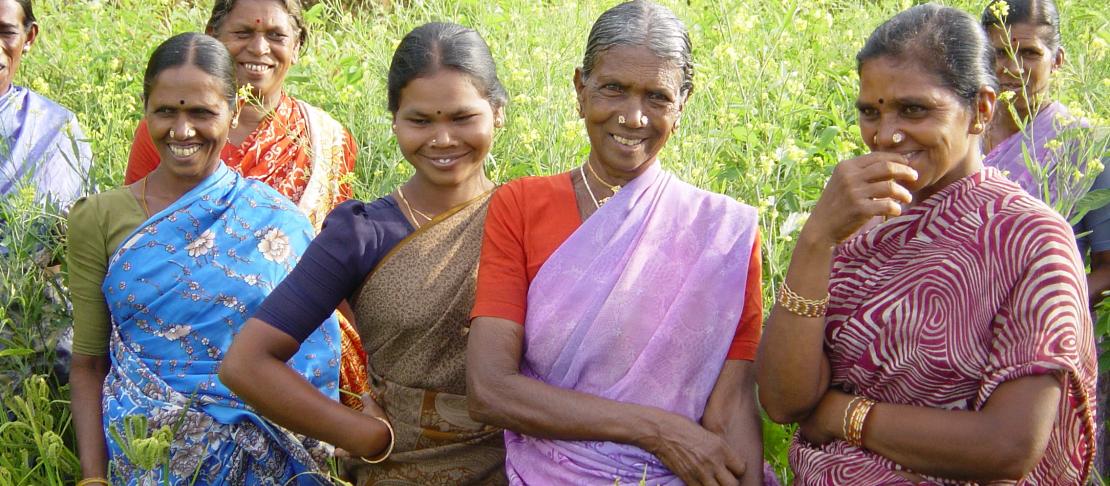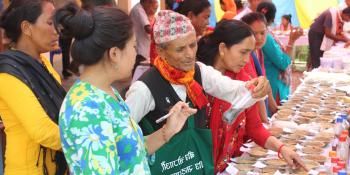Channeling the power of 'self-help' for gender empowerment in agriculture

In India, women’s self-help groups are being utilized and encouraged to create resilience among farmers.
When it comes to community vulnerabilities fostered by climate change, women are one of the highlighted groups. Since times immemorial, a collective front has often seemed to work out better for women in terms of addressing their issues. A similar innovative, collective construct is visibly operating in India with the nomenclature of self-help groups mostly among women in rural India. An initiative by Bioversity International on crop diversification through horticultural nurseries, with support of the CGIAR Research Program on Climate Change, Agriculture and Food Security (CCAFS), takes up this platform for promoting empowerment and resilience of rural women farmers.
Self-help groups as innovative platforms for change
Self-help groups are an organizational setup for the purpose of women’s empowerment through ensuring livelihood security. It comprises of a group of rural-resource poor women farmers from similar socio-economic backgrounds having a vision for fulfilling individual and social goals through a collective effort. The primary way to achieve it is by voluntarily saving and pooling their resources to form a common fund known as the group corpus. This corpus is then utilized by the members to improve the socio-economic conditions of themselves as well as the community.
Horticultural nurseries as modes of crop diversification
It is a verified fact that crop diversification leads to livelihood and nutrition security among farming communities. In India, Bioversity International has been creating crop diversification options based on locally contextualized needs such as in the case of Chitrakoot district of Uttar Pradesh (UP). The net sown area of the district is 174,000 ha, out of which 46,000 ha is irrigated. Irrigation is mostly done through canals. As water availability is limited, farmers often stick to a cereal-based cropping system which requires less irrigation. However, mixing cropping patters with horticultural crops would add to the diversity and build resilience against climatic threats to such mono-culture. One of the means for fulfilling this potential are nurseries.
Nurseries under a net house does not require a large landed area and in fact, by using elements such as plug trays to grow seedlings, land use space can be further minimized, thereby enhancing the prospects for generating a higher income for the growers. For farmers, access to healthy seedlings, free of pests and diseases is a visible advantage and raising horticultural crops through such seedlings proves to be highly beneficial, particularly in areas with hard soils such as Chitrakoot district of UP.
How are self-help groups channelized towards horticultural nurseries to build resilience among rural women?
Women farmers in self-help groups are being provided with an erected net house for production of quality planting material. Additionally, other accessories are being provided like plug-trays and coco-peat. Other than providing materials to the self-help groups, there are focused capacity building exercises such as trainings on advanced nursery management, exposure to technologies such as soil solarisation, irrigation, sowing, fertilization, raised beds, and pest and disease management. The self-help groups will be responsible for raising nurseries and selling plants and seedlings.
In Ganiva, Banadi, Baihar and Balapur villages of Chitrakoot district, the self-help groups have been trained to manage the commercial nurseries of tomato, gourds, brinjal, cauliflower and cabbage, among others. The nurseries are also being used to raise seedlings of flowers and fruits. Three out of five such proposed nurseries are already operational. Further, at each nursery site, 15-20 women farmers will be participating in the project activities while each of these nurseries will be providing planting material to approximately 50 farmers.
Mapping the sustainability of the initiative
To ensure that this initiative is sustainable and that the self-help groups are truly able to live up to the rationale behind such grouping, the project will ensure that half of the first season’s sale will be used to cover the next season’s expenses. The remaining half will be shared equally among the self-help group members. The project itself will be providing half of the cost for the initiative during the second year. From the third year onwards, the self-help group itself will take up the responsibility for running the nurseries. In addition to the running cost, 20% of the net income will be saved for the next season. Keeping up with the practice of collective input and output sharing characteristic of self-help groups, its members will be depositing 10% of their net income into a common account.
The vision of the initiative is to witness the mushrooming of more such nurseries which will not only add to farmers’ income but also ensure their resilience through crop diversification. Most importantly, this model run by women led self-help groups on replication will lead to achieving the twin goals of fortification while being inclusive.
Neeraj Sharma is a Scientist (Crop Diversification and Seed Systems) at Bioversity International, South and Central Asia. Arnab Gupta is a Scientist (Agroecology and seed Systems) at Bioversity International, South and Central Asia. N K Krishna Kumar is the Regional Representative for South and Central Asia at Bioversity International. Sonal Dsouza is the Communication and Program Assistant at Bioversity International, South and Central Asia.
Shehnab Sahin is the Communications Specialist at CCAFS South Asia.



